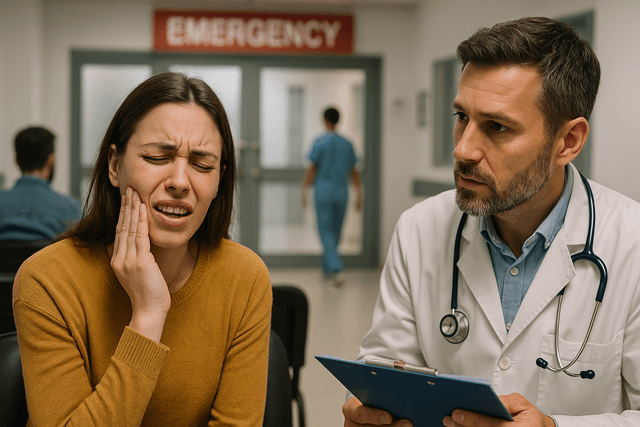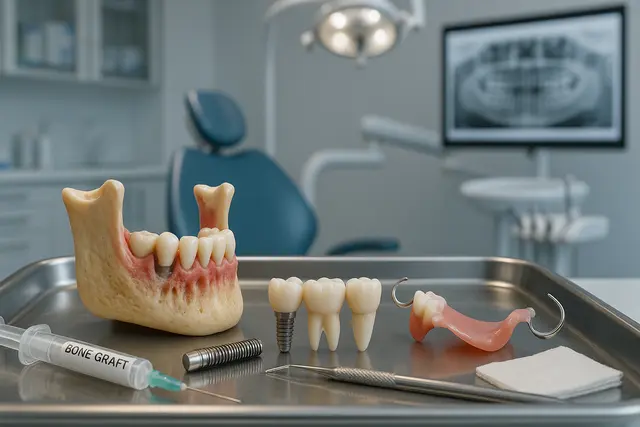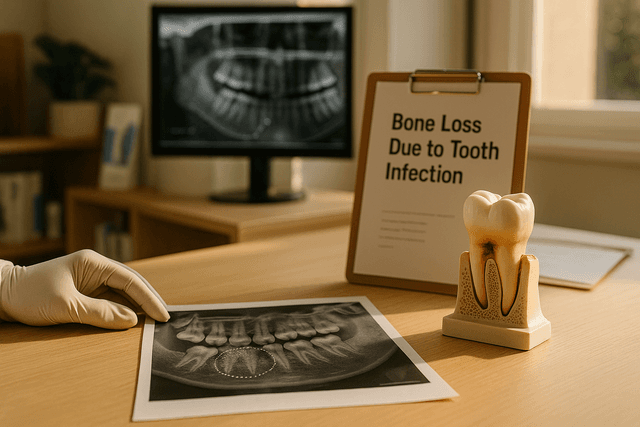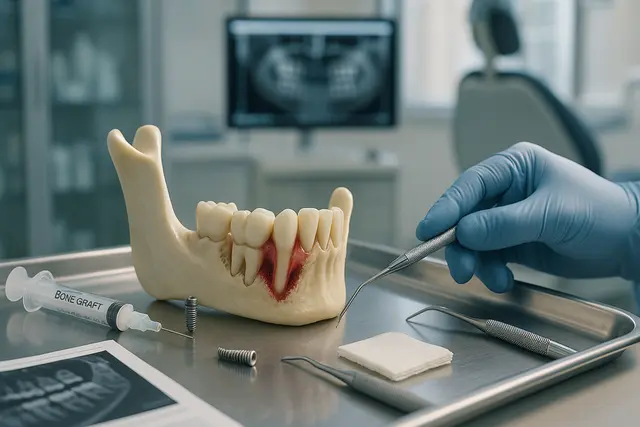Oral Health
6 min read
Jun 30, 2025
Should I Go to the ER for Tooth Pain? Signs It’s an Emergency
Tooth pain has a way of showing up uninvited, usually late at night or right before the weekend, just when your regular dentist’s office is closed. You’re left wondering: Is this something I can sleep off, or should I go to the ER?

Tooth pain always seems to hit at the worst possible moment, late at night, over the weekend, or right before a big meeting. You’re holding your jaw, debating whether this is something that can wait... or whether it’s time to throw on sweats and head to the emergency room. So let’s answer the big, throbbing question: Should I go to the ER for tooth pain? And if not, who should you call, and when?
Let’s break it down with real-life examples, practical advice, and a good dose of clarity, because when you’re in pain, the last thing you need is vague internet wisdom.
Tooth Pain That Might Not Need the Emergency Room
Not all tooth pain is a five-alarm fire. Some cases, while frustrating and uncomfortable, can usually wait until you can visit your dentist. Think of those dull, lingering aches that flare up when you eat hot or cold foods. Or maybe you just finished a marathon gum-chewing session, and now your jaw feels like it ran the Boston Marathon too.
These situations, while not fun, often stem from things like:
A mild cavity
Tooth sensitivity
A temporary crown that feels “off”
Gum irritation from brushing too hard or new flossing habits
If you’re dealing with pain at home that’s manageable with over-the-counter pain medication, try rinsing with warm salt water, applying a cold compress to your face or jaw, and taking over-the-counter pain relievers. Then, call your dentist to make an appointment. Even if it’s not an emergency, these kinds of dental problems still need treatment, just not necessarily at midnight on a Sunday.
When Tooth Pain Is a Dental Emergency
Here’s where things get serious. If your tooth pain is sharp, intense, and paired with swelling, bleeding, or signs of infection, it might be more than just a bad cavity. In some cases, dental issues can spiral quickly into emergencies that require immediate care. A few warning signs that scream "don’t wait" include:
Pain that doesn’t go away, even after taking over-the-counter pain relievers
Swelling in your gum, cheek, or jaw
A fever combined with tooth pain (a red flag for infection)
A foul taste in your mouth or pus, possible signs of a dental abscess
A cracked, broken, or knocked-out tooth
Trouble swallowing or breathing
These aren’t just uncomfortable, they’re potentially dangerous. A tooth infection can spread to other parts of the body. A dental abscess left untreated may affect your airway, especially if swelling reaches the throat. If you’re experiencing any of these, you might need emergency dental care or even to go to the emergency room.
Should I Go to the ER or See a Dentist?
Now for the tricky part. Should you go to the ER for tooth pain, or try to get in with a dentist first?
Here's the general rule of thumb: If you're in severe pain, experiencing uncontrolled bleeding, have facial trauma, or signs of a spreading infection (especially with fever or trouble breathing), go to the nearest emergency room. ER staff can offer pain relief, treat infections with antibiotics, and stabilize you until a dentist can take over.
But, and it’s a big but, most ERs are not equipped to handle actual dental procedures. They can’t pull a tooth, fix a broken crown, or treat your cavity. So if your pain is bad but not life-threatening, you’re usually better off calling an emergency dentist or urgent care dental clinic first. Many offer same-day appointments or have weekend hours specifically for dental emergencies.
If you don’t have a dentist, look up emergency dental services in your area. And if you're still unsure, call your regular dentist’s office, most have an emergency number or voicemail that can guide you on where to get help.
What Happens in the Emergency Room for Tooth Pain?
Let’s say you do head to the emergency room for tooth pain, what should you expect?
First, the ER staff will assess your overall condition. If they suspect a dental abscess, they may prescribe an antibiotic to reduce the infection. They might give you pain medication to tide you over. If you’ve suffered trauma, say, a car accident or sports injury, they’ll likely perform X-rays to rule out fractures or other damage to your face or jaw.
But again, they probably won’t fix the tooth itself. You’ll still need to see a dentist for treatment. That’s why, unless your situation is truly severe or dangerous, an emergency dental provider is usually the faster and more targeted option.
Also, let’s be honest: ER visits aren’t cheap. If your emergency doesn’t actually require hospital-level care, you might end up with a big bill and the same broken tooth you walked in with.
Can Urgent Care Help With Dental Emergencies?
It depends. Some urgent care clinics, especially in larger cities, are partnered with dental professionals or offer basic dental services. But many are not. If you’re considering going to urgent care, call ahead and ask if they handle dental emergencies. Otherwise, you may find yourself waiting only to be redirected to a dentist anyway.
Urgent care can be a helpful middle ground when you can’t reach your dentist, and your symptoms aren’t quite ER-level, but you still want immediate attention. It also helps to know how general dentistry providers approach emergency care.
What Can I Do for Tooth Pain at Home?
While you're waiting to see a dentist, or deciding if you need to go to the emergency room, there are a few things you can try for temporary relief:
Rinse with warm salt water to clean the area and ease gum irritation.
Apply a cold compress on the outside of your face to reduce swelling.
Avoid hot or cold foods, which may trigger or worsen the pain.
Take an over-the-counter pain reliever like ibuprofen or acetaminophen.
Keep your head elevated, lying down flat can sometimes make the pain worse.
These steps won’t fix the underlying issue, but they can help you get through the night or wait for an appointment with your dentist.
A Note About Broken Teeth, Crowns, and Knocked-Out Teeth
If you’ve got a broken tooth, a crack in your tooth, or a dental crown that’s come loose, treat it like a mini-emergency.
A knocked-out tooth, in particular, needs immediate care, preferably within 30 minutes. Try to place the tooth back in the socket without touching the root (yes, really), or store it in milk while you rush to get emergency dental services. Quick action can sometimes save the tooth.
If a dental crown has fallen off but you’re not in pain, try to keep the crown and call your dentist as soon as possible. If it’s sensitive or causing discomfort, you can use dental cement from a pharmacy as a temporary fix, but don’t wait too long to see your dentist for treatment. A tooth cap may be recommended.
Don’t Let Dental Pain Spiral Into a Bigger Problem
Ignoring tooth pain is like ignoring a leaky faucet, it usually gets worse. Many dental emergencies start small: a cavity you meant to get filled, a little gum swelling, or a twinge when chewing. But small dental issues can snowball fast, leading to infection, tooth loss, or a trip to the hospital emergency room if left unchecked.
So even if the pain isn’t excruciating, it’s always worth getting checked out. Early dental care can save you money, discomfort, and time away from work or family.
When in Doubt, Get Emergency Dental Advice
If you’re experiencing a dental emergency and aren’t sure whether to wait for an appointment or go to the ER, here’s your quick decision guide:
Is your pain severe, and won’t go away with over-the-counter pain meds?
Is there swelling, fever, or trouble breathing?
Did you suffer trauma or lose a tooth?
If yes to any of those, go to the emergency room or seek emergency dentist care right away. Otherwise, call your dentist and explain your symptoms. If you don’t have a regular dental office, look for a nearby emergency dentist or care clinic.
Tooth pain can be scary, but you’ve got options. And getting help quickly can make all the difference between a small fix and a big (and expensive) problem.
When Should I Go to the ER for Tooth Pain?
You should go to the ER if your tooth pain is severe and comes with swelling, fever, trouble breathing, or signs of a spreading infection. Trauma to the mouth or a knocked-out tooth also counts as a dental emergency. ER staff can manage pain and infection, but you’ll still need a dentist for long-term treatment.
What Counts as a Dental Emergency Versus a Regular Toothache?
A dental emergency usually involves intense, unrelenting pain, swelling, pus, bleeding, or a broken or knocked-out tooth. A regular toothache might feel uncomfortable but is usually manageable with home care until you can see your dentist. If over-the-counter meds help and there's no swelling or infection, it's likely not urgent.
What Can I Do at Home While Waiting to See a Dentist?
To relieve tooth pain at home, rinse your mouth with warm salt water, apply a cold compress to reduce swelling, avoid hot or cold foods, and take over-the-counter pain medication. Keep your head elevated when lying down to reduce pressure and pain until you can get professional care.
Can Urgent Care Clinics Treat Tooth Pain?
Some urgent care clinics offer basic dental services, but most are not equipped for complex dental procedures. It's best to call ahead to confirm. If they don’t handle dental issues, they may provide temporary pain relief and refer you to an emergency dentist for full treatment.
Read Next
Related Posts

Oral Health
Tooth Replacement Options to Prevent Bone Loss
Losing a tooth isn’t just about appearance, it can have a lasting impact on your oral health, jawbone strength, and overall quality of life. When teeth go missing, the jawbone begins to shrink, which can change your bite, your facial structure, and even your confidence. Fortunately, modern dentistry offers several effective solutions to replace missing teeth and prevent further bone loss.
4 min read
Sep 26, 2025

Oral Health
Bone Loss Due to Tooth Infection Explained: What It Means for Your Oral Health
A tooth infection isn’t just about pain, it can quietly damage the tissues around a tooth and even erode the jawbone that supports your smile. This guide explains how infections start, why they can lead to bone loss, the warning signs to watch for, and the treatments that can stop the spread and rebuild lost support.
5 min read
Sep 25, 2025

Oral Health
Understanding Bone Loss in Teeth: Causes and Treatments That Work
Bone loss in teeth is a silent threat that can compromise your smile, facial structure, and overall oral health. While it often goes unnoticed in the early stages, it can lead to serious consequences if left untreated. Understanding what causes dental bone loss, and how to prevent or manage it, is key to maintaining a strong, healthy foundation for your teeth.
5 min read
Sep 25, 2025
Don’t have time to research every dentist around you?
See why 30k+ patients trusted us